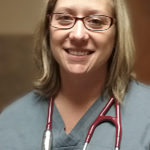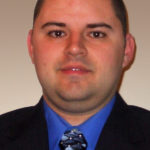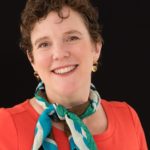By Bethany Hornbeck
Like HSTA itself, the young West Virginia professionals who have come out of the program are active throughout the state, living and working in their communities and making a difference. They are serving the health care needs of their towns and cities and establishing and growing local businesses. They are becoming leaders in their fields.
Meet a few of the West Virginia rising stars HSTA is proud to have served.
 Lindsey McIntosh, J.D.
Lindsey McIntosh, J.D.
Assistant General Counsel, West Virginia Department of Health and Human Resources
Lindsey McIntosh always thought of herself as someone who could impact her community, so when she was asked to join the legal team at the West Virginia Department of Health and Human Resources (DHHR), she knew she was home.
“In private practice, I was doing good work, but much of it was reactive, and that wasn’t quite what I was looking for,” McIntosh says. “At the DHHR, I write and review public policy and legislation about health care issues facing our elders, our children and so many others. I think of this as problem-solving—proactive lawyering that can help us avoid issues rather than having to fix them. Our work makes a great impact—hopefully the right impact—across the state. That’s why I’m so happy here.”
Her time at HSTA helped give McIntosh the foundation on which she now stands.
“Any job I do, I say to myself, ‘How am I impacting the people around me?’ That’s because of the HSTA building block. My love of public service grew out of summer camp. Then, when I sat on my HSTA region’s local governing board as its student representative, I got to see the judicial process and how ideas are turned into action. I was a student voice, but what I said mattered. Serving on the board showed me a different side of life than just being a 15 year-old. I was impressed by it then. I’m even more so now.”
McIntosh started as a biology student at WVU, but she quickly realized business and later law was the direction she needed to take.
“I loved biology,” she says. “I loved the medical field of knowledge and the idea of getting from a bad place to a good one. But working directly in the field wasn’t for me. Instead, I’m a health care attorney working with hospitals, public health officials and allied health workers. HSTA was the reason I started doing any kind of health care, and here I am today. It changed my life, and it’s something I forever value.”
 Stephanie Tyree, J.D.
Stephanie Tyree, J.D.
Executive Director, West Virginia Community Development Hub
Stephanie Tyree is the executive director for the West Virginia Community Development Hub, a statewide nonprofit that works with small towns to improve their communities. The Hub helps leaders and volunteers undertake complex community-building and policy-development efforts. It also participates in partnership programs like Turn This Town Around, Try This West Virginia and What’s Next West Virginia.
“The idea is that vibrant, welcoming, engaging communities are the ones that attract new residents and businesses,” says Tyree. “It’s the first step toward larger economic development.”
After earning her Juris Doctor at New York University, Tyree worked for a few years in New York City, but she wanted to come back to West Virginia. “I was passionate about bringing my skills back home,” she says.
That passion originally grew out of her time at HSTA. Tyree was from urban Kanawha County, but the HSTA friends she made were from rural McDowell, Raleigh and Greenbrier counties. “I got kind of rocketed out of the group of students I’d grown up with my whole life, and I suddenly had this new crew of people around me,” she says.
The group really clicked and visited each other often. “HSTA is like an intrastate youth exchange program, and that is one of its greatest elements,” says Tyree. “Before HSTA, I’d never had the experience of strangers inviting me to stay with them, welcoming me with open arms. Usually we West Virginians learn about each other as tourists or outside observers watching the news. But I literally spent weeks with my friends’ families, getting to know communities that weren’t on my radar at all and were different than my own in big and little ways. It gave me both a self-awareness and an awareness of the world around me.”
Those friendships are just one of the pieces that has made Tyree committed to having an impact. They have also helped her understand there are differences across the state but also broad connections and similarities.
“That’s at the root of community development,” she says. “There is uniqueness in each community, but we’re all trying to do similar work to make our communities better.”
 Candice Arnwine, MSW
Candice Arnwine, MSW
Case Management Supervisor, Coordinated Council for Independent Living
“When I was 7 years old, I decided to be a doctor,” says Candice Arnwine, case management supervisor for the Morgantown office of the Coordinated Council for Independent Living. “I thought that was the way into health care, but I found through HSTA that health means mental health too. I was falling for psychology, and I discovered a way to integrate everything I loved into one career.”
Using her HSTA tuition waiver, Arnwine earned a bachelor’s degree in psychology and a master’s in social work. She considered a Ph.D. as well but realized that research and paper-writing gave her too little time with people. “I wanted to be involved in my clients’ recovery, to see what they’re going through in their environment,” she says.
An internship at WVU’s Center for Excellence in Disabilities gave her pivotal experience working with the medical aspects of disabilities and navigating the Medicaid waiver program that funds disability support. She changed her track and is now helping people with special needs remain at home, either independently or with family. She oversees a team of case managers and monitors the implementation of client treatment plans under waiver funding.
“My job combines two things I have a passion for: health care and social services,” she says. “It’s hard work, but I like a challenge.”
 Natalie Fraley, DVM
Natalie Fraley, DVM
Owner, Middletown Animal Clinic
After five years working at Middletown Animal Clinic in Fairmont, WV, Natalie Fraley had the opportunity to purchase the business, and she took it.
“This where I started my career, so I knew our operations inside and out,” says Fraley. “I had relationships with our clients, our employees and the community. It was really the perfect time and the perfect place.”
Originally from Webster County, Fraley settled in Fairmont to do what she’d set out to do, even before she joined a health-based after-school club called HSTA.
“I always wanted to go into veterinary medicine,” she says. “I was kind of a science geek. HSTA’s emphasis on health and its forensic science and investigative labs, those got my attention. In fact, science is the major reason all of us were in the program. It was an opportunity to learn and a good place to share experiences with people who liked the same things.”
Now Fraley is an integral part of the small-animal health community in and around Fairmont.
“I love the medical part of my job,” she says. “Surgery, ultrasound, digital x-ray, laser therapy—we do it all.”
Fraley also does a lot for HSTA. She awards a $1,000 college scholarship to a Webster County HSTA student every year. She also supports the annual HSTA senior banquet where the winner is announced.
“My parents were teachers,” she says. “They stressed the importance of education and encouraged us to do well in school. Webster County is definitely a poorer county, so anything we can do to help our kids get an education is important. We need to encourage them and show them what’s out there and that they can do well. It’s not hard. You just need to give it a try.”
 Andrew McDavid
Andrew McDavid
Co-owner, A&M Properties & Investments
Andrew McDavid may not be working in the STEM arena, but he’s still using skills and values he gained in HSTA 20 years ago: leading projects, making connections and giving back to the community. McDavid is co-owner of A&M Properties & Investments, which purchases, renovates and resells commercial and residential properties.
“I moved back to West Virginia from Atlanta in 2007, got married in 2011, and my wife and I started flipping properties on the side,” he says. “Then I sold one to a man I’d never met. We closed the deal and talked for another three hours. He ended up becoming my partner. We found an investor, went at it full time, and here we are, three years later.”
Today, A&M is one of the biggest home buyers in the Charleston area with 12-20 homes in rehabilitation at any one time. “We buy a lot of houses,” says McDavid. He also helps a lot of people.
McDavid is a member of the HSTA Kanawha Region’s local governing board, as well as a former mentor at South Charleston High School. He also offers services through A&M that make it possible for people with minimal credit to become home owners, including rent-to-own options, free credit counseling and incentives for buyers who improve their credit scores while working with his company.
“We have a lot of things we want to do, it’ll just take some time to get there,” he says.
If the energy and capabilities McDavid has put in so far are any indication, he’ll get where he’s going and help a lot of people along the way.
“At South Charleston High School, I was part of the inaugural HSTA class,” he says. “We had great teachers. They kept a tight rein but treated us like adults. They gave us a lot of learning, a lot of life skills and a lot of fun. I know they weren’t making a ton of money. They wanted to help the kids. That left an impact on me. We benefited from people giving to us. I want to do the same.”
 Kristafer Adkins, MS
Kristafer Adkins, MS
Assistant professor, WVU School of Dentistry
“The HSTA tuition waiver made all the difference in my career path,” says Kris Adkins, assistant professor in the department of dental hygiene at WVU’s School of Dentistry. “I wouldn’t be teaching here without it. To be an instructor at the bachelor’s level, you have to have a master’s degree, and higher education is very expensive.”
The waiver allowed Adkins to continue his education beyond undergrad. He’s now on track to advance in the field of higher education itself. In addition to fulfilling his duties as a faculty member, he is pursuing a second master’s in higher education administration with the intention to complete his doctorate in education.
“Long term, I’d like to serve as a program director somewhere in the state and eventually as a dean or even provost,” he says. “I’ll keep my options open as long as I can.”
HSTA made a great difference to Adkins, and Adkins has made a great difference to HSTA. “When HSTA calls, I do my best to answer, especially if what they need involves current students,” he says.
When he was in college, Adkins served as a student mentor at HSTA’s summer institutes and worked in the HSTA administrative offices. As a professional, he speaks at job fairs sponsored by the program, and he is now preparing to serve as an inaugural committee member for the new HSTA Alumni Association.
“When I was in HSTA, the mentors impacted me greatly,” says Adkins. “Another student who was a couple of years older than me was a terrific mentor, a wonderful person and later a close friend in college. There were also a lot of university athletes working as mentors. There were many similarities between them and us, and we looked up to them.”
Working in the administrative office let Adkins become close with the professionals who run the program day-to-day.
“They were very encouraging and very helpful, even though I was out of the program and in college,” he says. “HSTA is like a family, and once you’re a part of it, there’s always someone looking out for you.”
Adkins hopes he can make a difference too. “After they hear me speak at a club meeting or a career fair, I want the kids to realize that even when they come from challenged backgrounds, they can still make something of themselves and that HSTA is here to show them the way.”
This is Part II of a two-part article. To read Part I, visit www.wvexecutive.com/hsta-making-good-west-virginia-promise/.
 About the Author
About the Author
Bethany Hornbeck is a freelance communications specialist who has worked for 25 years in the private, public and nonprofit sectors. She also serves as the professional development director for the National Association of Government Communicators. Hornbeck recently returned to West Virginia after spending a decade in Pittsburgh and now lives in Grafton with her young family.



